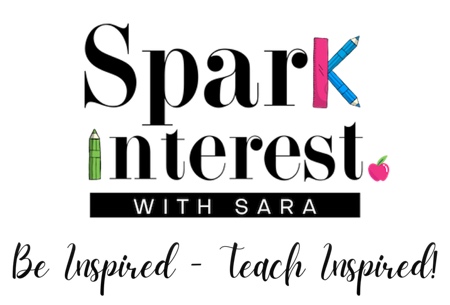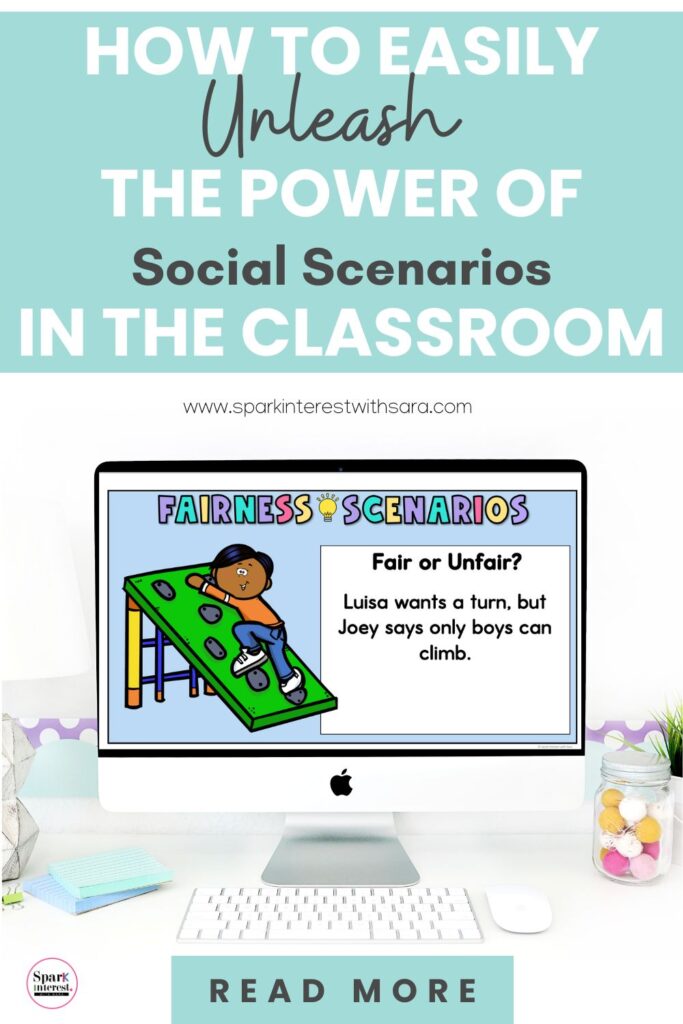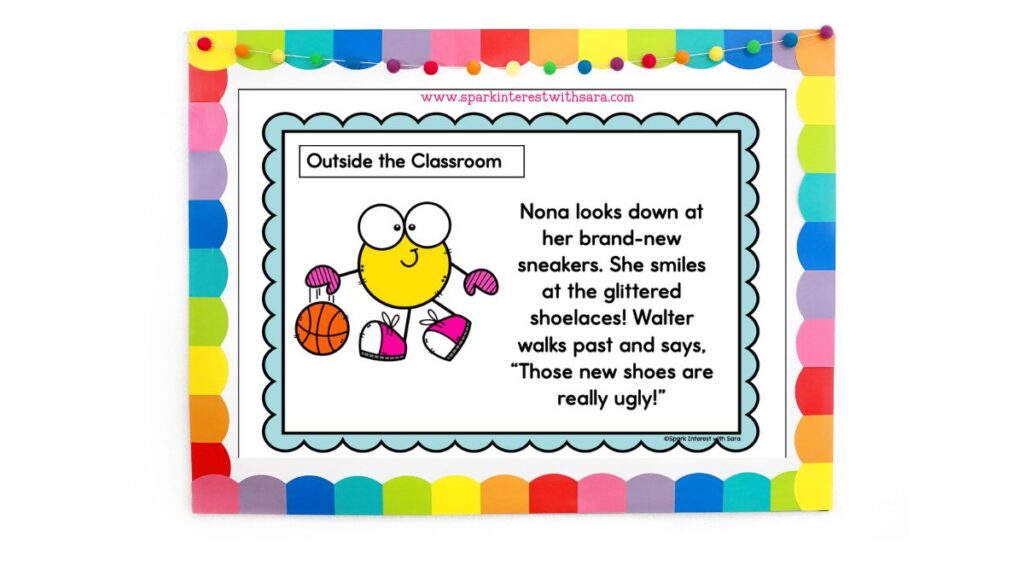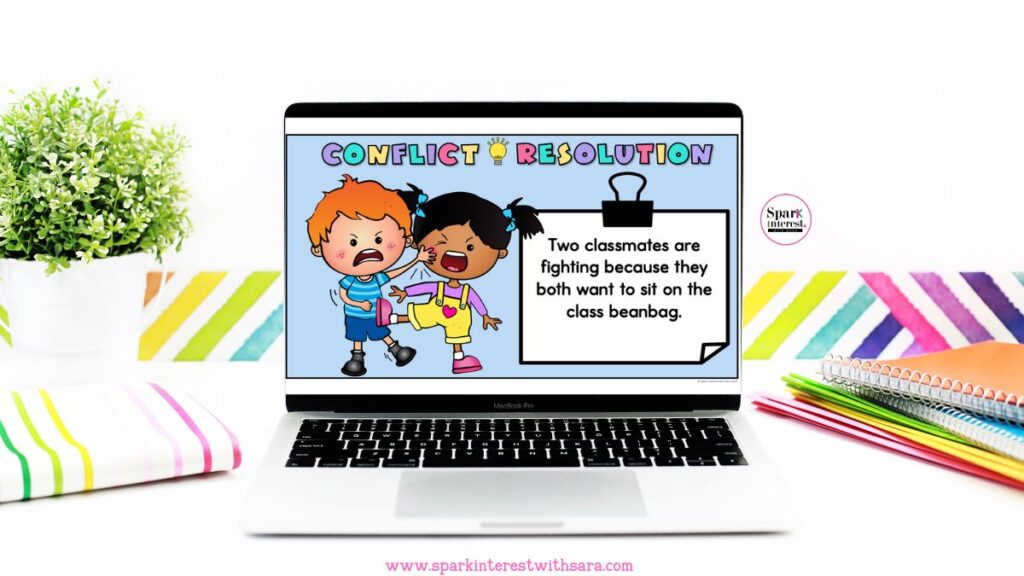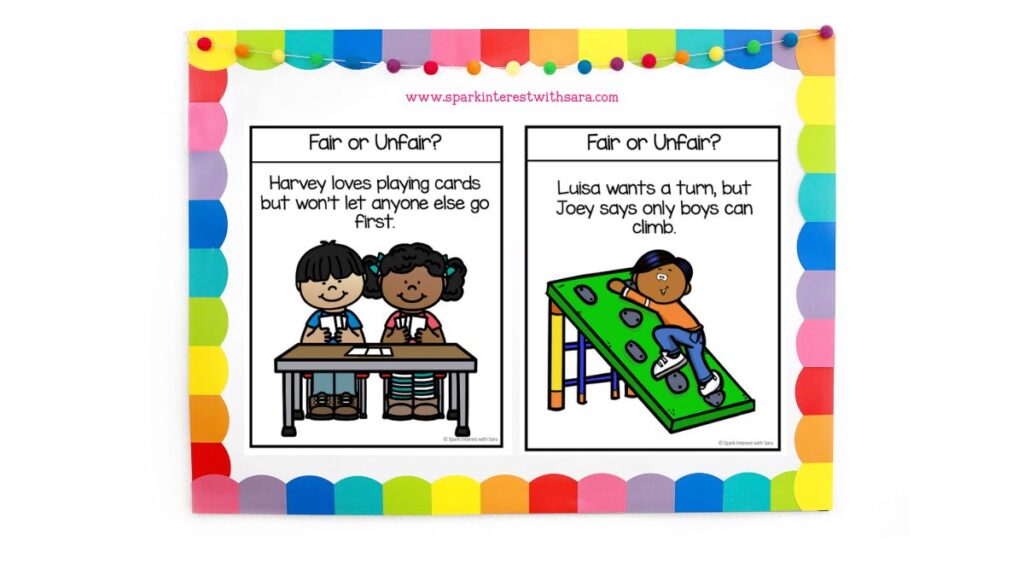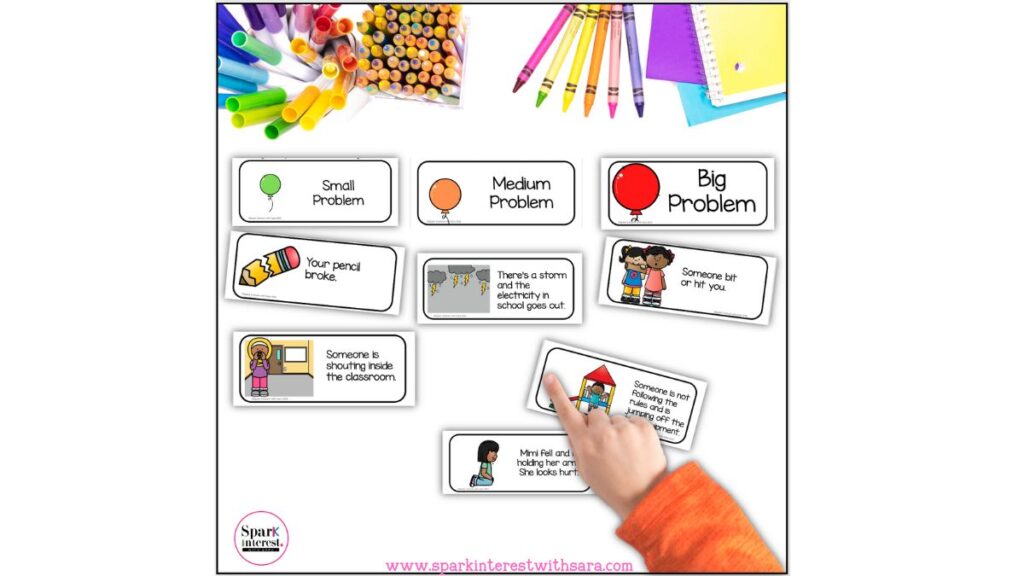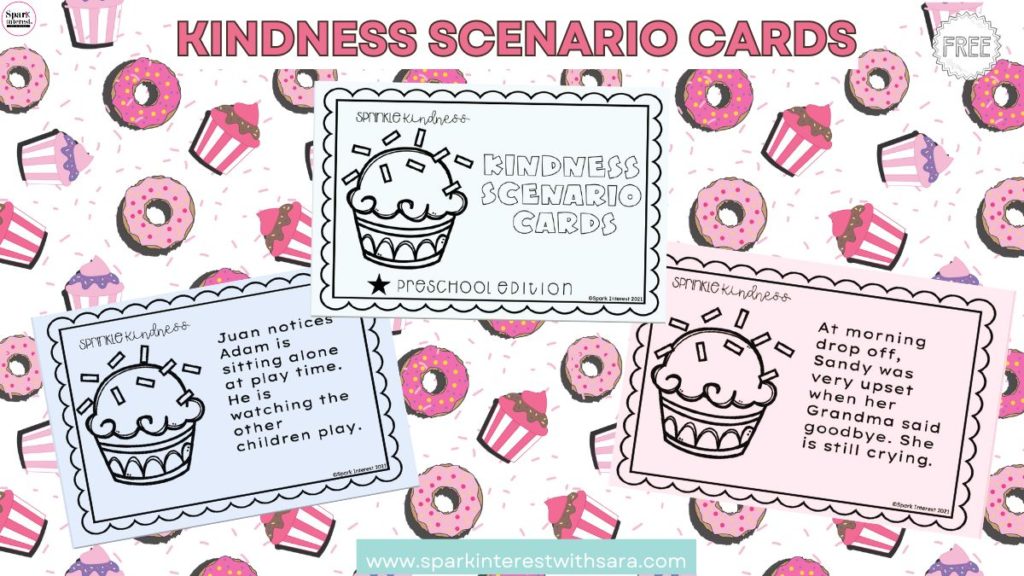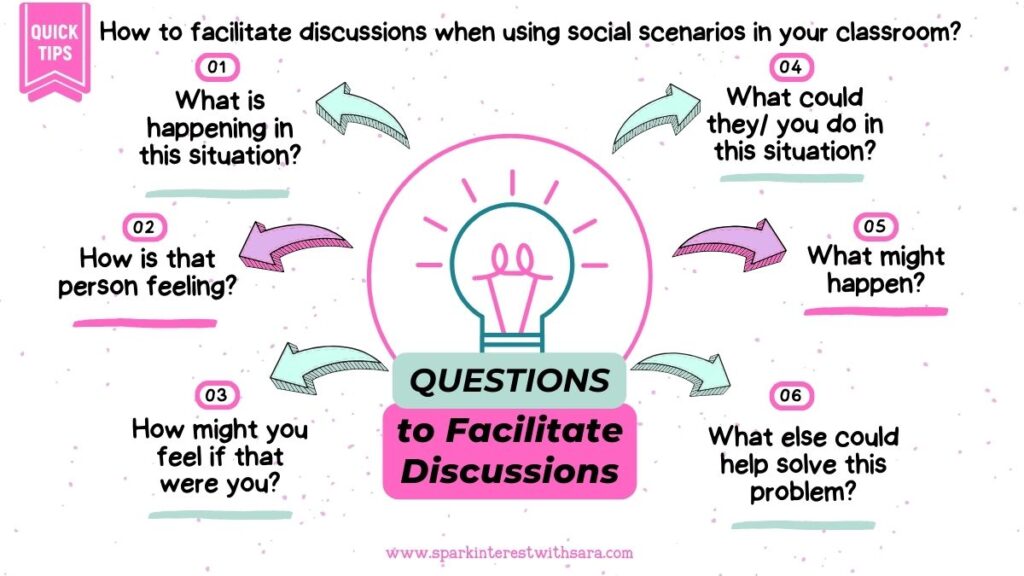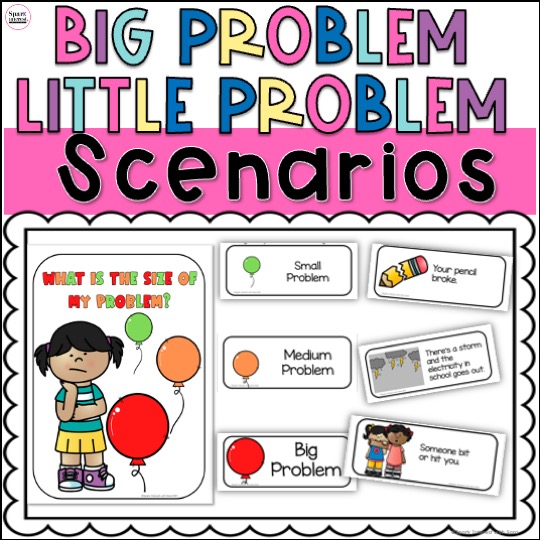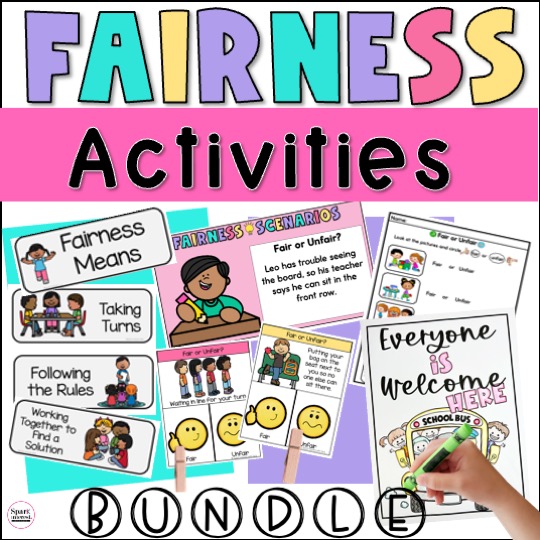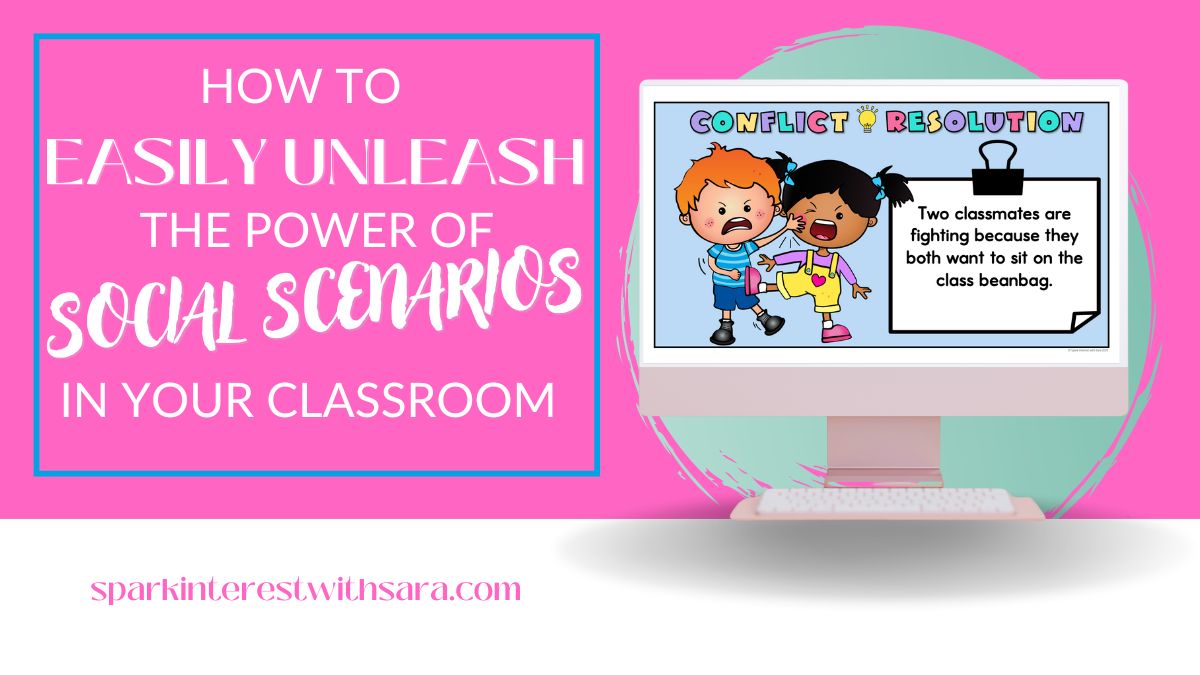
Do you use social scenarios in your classroom? Perhaps you are curious about using them effectively with your students. If you have dabbled, do you feel like you need some fresh ideas on how to maximize their power? If you’ve answered “Yes” to any of these questions, you are in the right place!
In this blog post, we will delve deeper into the power of social scenarios in the classroom and explore strategies that can be implemented to unleash their full potential. By incorporating social scenarios into your lesson plans, you can tap into students’ natural inclination to learn through experiences and create a vibrant and dynamic learning environment.
In this blog post, I share with you the many benefits of social scenarios and demonstrate how they can revolutionize the way your young students learn and engage in learning and reinforcing different social emotional learning skills.
What are Social Scenarios?
Social Scenarios are hypothetical situations designed to enhance social skills through real life examples. Social scenarios are a great tool to get children thinking and talking about how their actions affect others.
Benefits of using social scenarios for learning and engagement
Social scenarios offer so many benefits when it comes to enhancing learning and engagement in the classroom.
- Development of critical thinking skills: By immersing students in realistic situations, social scenarios challenge them to assess and analyze information, make informed decisions, and evaluate the consequences of their actions. This process encourages students to think critically, weigh different options, and develop problem-solving strategies with other students.
- Fosters Creativity and Innovation: By presenting students with real-life challenges, we can provide a platform for our students to think outside the box, generate unique solutions, and explore alternative perspectives. This approach nurtures creativity and encourages our students to approach problems with an open mind, leading to innovative thinking and out-of-the-box solutions.
- Develop Empathy and Strengthen Communication Skills: By assuming different roles and perspectives, students gain a deeper understanding of others’ experiences and emotions. This cultivates empathy and promotes a sense of understanding and compassion among students. Furthermore, social scenarios require students to communicate effectively with their peers, improving their verbal and nonverbal communication skills, active listening, and collaboration abilities.
- Increases Motivation and Active Participation: Social scenarios that are relevant to your students and what they are going through will tap into your students’ natural curiosity and interest. Your students will want to interact with the subject matter because it is relevant to them.
Types of Social Scenarios
- Social Scenarios: The role of social scenarios are, they present common social problems that may occur in the classroom for our young learners. Social scenarios will provide our young learners with the opportunity to discuss what problems may arise, empathize with others, consider how other people are feeling and what to do when those situations occur.
Social Scenario Example:
- Conflict Resolution Scenarios: Conflict resolution scenarios can be a great addition to your Unit on Conflict Resolution and will get your students brainstorming ways to deal with different types of conflict they may encounter in the classroom.
This is a perfect way for your students to practice the conflict resolution techniques you have introduced to your students in previous lessons. Scenarios that highlight common issues will be the most engaging for your students; so prepare scenarios that you have witnessed yourself happen in your classroom. For example, when two students want a turn of a certain resource at the same time or when someone is doing something you don’t like.
Conflict Resolution Scenario Example:
- Fairness Scenarios: Teaching a Unit on Fairness? This can be a tricky concept for our young learners to grasp; so using Fairness scenarios will really help your students identify unfair situations and help them develop the language to describe it. Being able to identify unfairness will help your students gain greater understanding of how it hurts others and in turn help develop empathy. You could role play different Fairness Scenarios and have your students work in pairs or small groups to come up with ways to make the situation fair.
Fairness Scenarios Example:
- Big Problem Little Problem Scenarios:
Big Problem Little Problem Scenarios will help your young learners differentiate between small, medium, and big problems.
Helping your students see that not all problems are equal, is a great first step in helping our preschool or kindergarten students deal with problems that occur in school.
Why help young learners understand Big Vs Small Problems?
Having an understanding of big problems vs little problems will allow our students to see that not all problems are the same; therefore, our reactions will defer according to the size of a problem.
Big Problem Little Problem Scenarios Example:
5. Kindness Scenarios: Use Kindness Scenario Cards in your classroom to help your students see that you can sprinkle kindness into your everyday! These Kindness Scenario Cards are a free resource I created and use in my classroom. Click on the image to download them today! Use them in your morning meeting or as part of your Unit on Kindness.
Role-playing and group discussions in social scenarios
Role-playing and group discussions are essential components of social scenarios as they promote active participation, communication, and collaboration among students. Role-playing allows students to assume different roles and perspectives, while group discussions provide a platform for students to share their ideas, ask questions, and engage in meaningful conversations.
When incorporating role-playing and group discussions into social scenarios, here are a few things to think about:
- Provide clear roles and instructions: Clearly define the roles that students will assume in the scenario. This ensures that students have a clear understanding of their roles and can fully immerse themselves in the scenario.
- Encourage empathy and perspective-taking: Role-playing allows students to step into the shoes of others and experience different perspectives. Encourage students to empathize with the characters they are portraying and consider their motivations, emotions, and concerns. This fosters empathy, understanding, and a deeper appreciation for diverse viewpoints.
- Encourage active listening: Encourage active listening, respectful communication, and the exploration of different ideas and opinions. This creates a safe and inclusive environment where students feel comfortable sharing their thoughts and perspectives.
- Facilitate reflection time: After the role-playing and group discussions, facilitate a reflection session where students can reflect on their experiences and share insights. This helps students make connections between the scenario and the broader concepts and skills they are learning.
Possible Question Prompts to Facilitate Discussions:
Wondering how to facilitate discussions when using social scenarios in your classroom? Here are some possible question prompts that will help guide discussions if your students get stuck.
- What is happening in this situation?
- How is that person feeling?
- How might you feel if that were you?
- How might the other person be feeling?
- What could they/ you do in this situation?
- Has this ever happened to you?
- What might happen?
- What if it doesn’t work?
- What else could help solve this problem?
The CASEL SEL COMPETENCIES supported by using social scenarios in your classroom:
1.Self Awareness: The ability to understand one’s own emotions, thoughts, and values and how they can influence behavior.
2.Relationship Skills: The abilities to establish and maintain healthy and supportive relationships and to effectively navigate settings with diverse individuals and groups.
3. Self-Management is the ability to manage one’s emotions, thoughts, and behaviors effectively in different situations and to achieve goals and aspirations.
4. Responsible Decision-Making is the ability to make caring and constructive choices about personal behavior and social interactions across diverse situations. This includes the capacity to consider ethical standards and safety concerns and to evaluate the benefits and consequences of various actions for personal, social, and collective well-being.
Taken from: CASEL.org
How Social Scenarios Enhance Critical Thinking Skills
Social scenarios provide an ideal environment for enhancing critical thinking skills among students. The immersive nature of these scenarios allow students to analyze complex problems, evaluate information, and make informed decisions. By engaging students in realistic situations, we can provide a platform for our students to apply their knowledge and skills in a practical context.
In addition to critical thinking and creativity, social scenarios also enhance students’ communication and collaboration skills. By engaging in role-playing and group discussions, students learn to express their thoughts and ideas effectively, actively listen to their peers, and work together to find solutions.
This promotes effective communication, teamwork, and collaboration, which are essential skills for our students.
Creating realistic and relevant social scenarios
The key to the success of social scenarios lies in their realism and relevance. When designing social scenarios, we need to make sure we aim to create experiences that closely mirror real-life situations and challenges that our students may encounter inside and outside the classroom. Here are some tips for creating realistic and relevant social scenarios:
- Draw from real-world examples: Look for real-world examples that relate to the social skill you are teaching. These examples can be taken from observations you have made in your very own classroom. What are your students needing extra support in? By drawing from real-world examples, you make the scenarios more relatable and meaningful for students.
2. Consider diverse perspectives: When designing social scenarios, consider incorporating diverse perspectives and viewpoints. This allows students to explore different angles and develop a broader understanding of the issues at hand. By exposing students to multiple perspectives, educators foster empathy, critical thinking, and an appreciation for diversity.
3. Seek feedback from students: Involve students in the process of designing social scenarios by seeking their input and feedback. Ask students for suggestions on scenarios they find interesting or relevant to their lives. By involving students in the design process, you can create scenarios that are more meaningful and engaging for your students.
Remember that the goal of creating realistic and relevant social scenarios is to provide students with an authentic and immersive learning experience that prepares them for real-life challenges in your classroom.
Conclusion: Empowering students through social scenarios
Through social scenarios, students are given the opportunity to apply their knowledge in real-life situations, fostering critical thinking and problem-solving skills. This approach not only enhances understanding but also encourages creativity and innovation. Furthermore, social scenarios provide a safe space for students to explore different perspectives, develop empathy, and strengthen communication skills.
Let's Connect:

Sara
